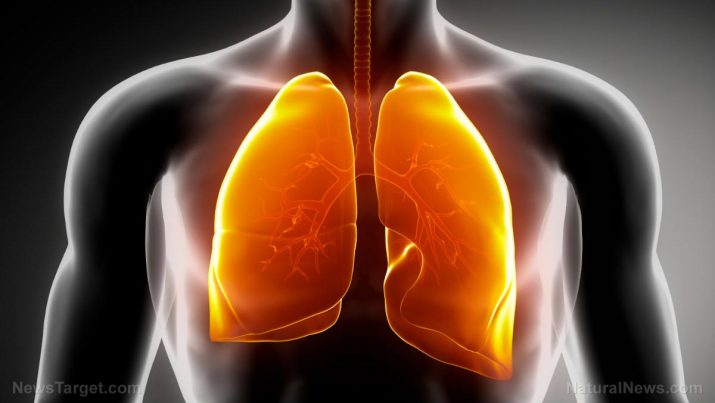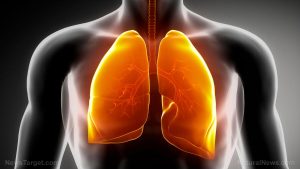
Silicosis – causes, side effects and treatments at NaturalPedia.com
Wednesday, June 27, 2018 by Zoey Sky
http://www.naturalpedia.com/silicosis-causes-side-effects-and-treatments-at-naturalpedia-com.html

Silicosis is a lung disease that occurs when an individual breathes in too much silica dust over an extended period of time. Any level of silica dust exposure can cause silicosis.
Silica, a very common crystalline mineral, can be found in quartz, rock, and sand. Silica dust is dangerous for individuals who work with concrete, glass, stone, or other types of rock.
There are three types of silicosis:
- Acute silicosis– This form of the disease develops after several weeks or months of high levels of silica dust exposure. Acute silicosis progresses rapidly.
- Accelerated – Accelerated silicosis develops five to 10 years after an individual is exposed to silica dust.
- Chronic – Chronic silicosis occurs 10 years or more after silica dust exposure. Even low exposure levels can cause chronic silicosis.
Silica dust particles act as tiny blades that harm the lungs. If inhaled through the nose or mouth, these particles leave small cuts that may scar the lung tissue. When the lungs are scarred, they can’t open and close properly. This usually causes breathing problems.
The U.S. Department of Safety has classified silica as a carcinogen, which means silica can cause cancer (e.g., lung cancer).

Known side effects of silicosis
The side effects of silicosis usually include a cough, shortness of breath, and weight loss.
Individuals who work in industries with high levels of silica dust exposure are at great risk of developing silicosis. These jobs usually include:
- Abrasives manufacturing
- Glass manufacturing
- Mining
- Quarrying
- Road and building construction
- Sandblasting
- Stone cutting
Body systems harmed by silicosis
Silicosis may cause the following complications:
- Arthritis
- Chronic obstructive pulmonary disease (COPD)
- Heart failure
- Kidney disease
- Lung cancer
- Pulmonary hypertension
- Tuberculosis (TB), along with other chest infections
Food items or nutrients that may prevent silicosis
The following foods or nutrients can help prevent silicosis or address its side effects:
- Cannabis – The cannabinoids within this plant can boost the immune system and help lower cancer risk. Cannabinoids are also linked to bronchodilation, especially when vaporized. Thanks to its anti-inflammatory properties, cannabis can help the respiratory tract expand, which makes it easier to breathe.
- Chaparral – Chaparral is an herb that is used to make tinctures and tea with strong antihistamine, antibacterial, and decongestant properties. The herb is often used as a remedy for various breathing issues and lung-related health problems.
- Licorice – Licorice root is a trusted remedy for respiratory issues because it has antibacterial, anti-inflammatory, antiviral, expectorant, and soothing properties.
- Mullein – Mullein leaves have an extract with potent anti-inflammatory and antioxidant abilities that can help eliminate mucus and soothe the raw and inflamed tracts of the respiratory system.
- Oregano – Oregano’s essential oils and acids make it an effective remedy for respiratory issues. It contains rosmarinic acid, which has potent antihistamine effects. The acid acts as a decongestant, and it also has powerful antibacterial properties.
- Peppermint – Menthol, a crucial active ingredient in peppermint, can help clear breathing passageways, neutralize free radicals, reduce allergic attacks, and soothe inflammation.
- Thyme – This herb has antibiotic, anti-fungal, and antiviral properties. Thyme can help partially clear up respiratory infections.
Treatments, management plans for silicosis
Since silicosis can’t be cured, treatments aim to address its side effects.
Treatments for the disease include:
- Inhalers – These can help open up a patient’s airways.
- Lung transplant – Patients with severe silicosis may need a lung transplant.
- Medications – Some medications can help ease cough symptoms and treat respiratory infections.
- Oxygen masks – Some individuals with silicosis wear oxygen masks to increase the amount of oxygen in their blood.
Lifestyle changes that can help patients with silicosis include avoiding further silica exposure. Patients should also quit smoking since smoking damages lung tissue.
Where to learn more
- Does kitty litter contain harmful substances?
- How the ‘Discoverer’ of ‘AIDS’ in 5 Gay Party Boys from 1981 Made the Biggest Blunder in History
- Oil and gas companies use 40-plus toxic chemicals near California homes, schools and hospitals
- Stop Using Magnesium Stearate… Go Organic!
- This Homemade Elixir Cure Nagging Cough & Lung Inflammation Very Effectively
Summary
Silicosis is a lung disease that occurs when an individual breathes in too much silica dust over an extended period of time.
The side effects of silicosis usually include a cough, shortness of breath, and weight loss.
Silicosis may cause complications like arthritis, heart failure, and kidney disease.
Cannabis, chapparal, licorice, mullein, oregano, peppermint, and thyme can help prevent silicosis or address its side effects.
Since silicosis can’t be cured, treatments aim to address its side effects. Treatments for the disease include inhalers, a lung transplant, medications, and oxygen masks.
Lifestyle changes that can help patients with silicosis include avoiding further silica dust exposure. Patients should also quit smoking since smoking damages lung tissue.
Sources include:
Tagged Under: Tags: Silicosis





